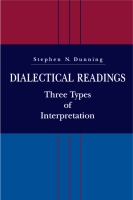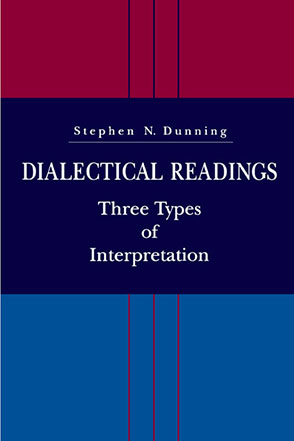Dialectical Readings
Three Types of Interpretations
Stephen N. Dunning
“This sort of interdisciplinary thinking is unavoidably tricky, preliminary, and controversial, but it seems to me crucial for the survival of the humanities as intellectual disciplines at the present time.”
- Description
- Reviews
- Bio
- Subjects
In Dialectical Readings, Dunning distinguishes three types of interpretation, each defined in terms of a distinctive dialectical way of thinking: theoretical interpretation, which assumes binary oppositions; transactional interpretation, which seeks reciprocal relations; and transformational interpretation, which discerns paradoxical meanings. Dunning offers new and insightful readings of familiar texts by B. F. Skinner, Claude Lévi-Strauss, Lee Benson, Roland Barthes, Friedrich Nietzsche, and Michel Foucault and sheds new light on works by Thomas Kuhn, Joseph Campbell, Reinhold Niebuhr, Søren Kierkegaard, Paul Tillich, and Paul Ricoeur. Dialectical Readings enables readers to recognize diverse dialectical approaches to understanding—their own as well as those of others—in a way that provides new and helpful insights into a wide variety of subjects in which conflicting interpretations abound.
“This sort of interdisciplinary thinking is unavoidably tricky, preliminary, and controversial, but it seems to me crucial for the survival of the humanities as intellectual disciplines at the present time.”
“I believe this is a significant contribution to the field. It advances theoretical discussion by offering an original typology that is made concrete in the variety of texts that are presented as illustrative of each of the three major types of interpretation. The scholarship is sound and an amazingly wide variety of sources have been used very creatively.”
Stephen N. Dunning is Associate Professor and Chair of Religious Studies at the University of Pennsylvania. His books include Kierkegaard's Dialectic of Inwardness: A Structural Analysis of the Theory of Stages (1985) and The Tongues of Men: Hegel and Hamann on Religious Language and History (1979).
Mailing List
Subscribe to our mailing list and be notified about new titles, journals and catalogs.




